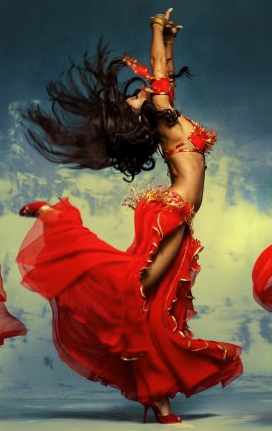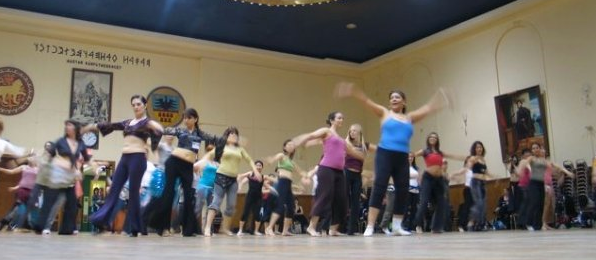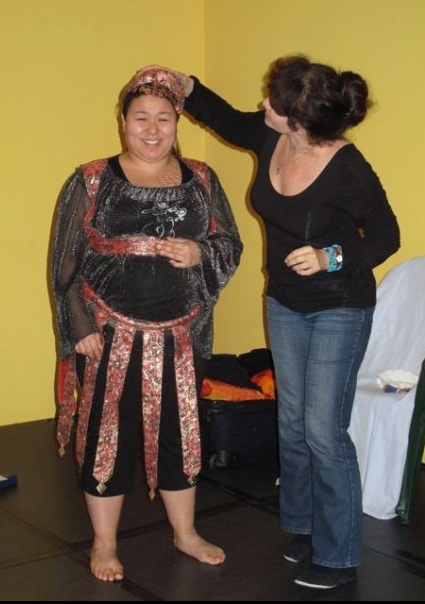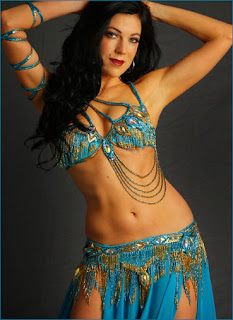INSPIRATION:

There are certainly more people bellydancing than ever before, and many more talented dancers. But being a great performer does not necessarily make a good teacher, and vice versa. Someone may have a great website and look absolutely stunning, but that does not make them a good dancer. You may fall in love with a performer, and find them cold and disorganized as a teacher. One thing is for sure, you want to be inspired by your teacher, so finding someone who's performance style you love is important. If you find a dancer to be awkward and uncomfortable as a performer, they will likely be the same in class, and may not be comfortable teaching to large groups.
PROFESSIONALISM:
Does the teacher have respect for themselves and for the art form? Seeing one of their performances can be a good way to find out. Do they act bawdy and crass, or classy and professional? Do they teach in a clean, safe studio, or some sketchy dive? Do you really want to associate yourself with someone who is doing the art form a disservice? Also, remember that price should NEVER be your top priority, if you want to get your money's worth. A true professional will not undercut other teachers and devalue the profession by giving away their work for free or at a deep discount. Even if they turn out to be a knowledgeable teacher, it shows a lack of respect to other teachers who work hard to make a living.SAFETY:
Many people just want a fun class to get fit, feel sexy and have fun. This is a great reason to take a bellydance class! But just because you don't have any professional ambitions doesn't mean you should go to just anyone. Many newbie teachers say, "Oh, I know I'm not that experienced, but I only teach beginners". Beginner is the absolute most important level! 90% of advanced moves are a combination of isolations learned in beginner, and if you learn bad technique from the beginning, trust me, it is MUCH harder to unlearn than it is to learn something from scratch.The other issue is your safety. Bellydance may seem like a gentle dance form, but all that hip twisting, shoulder snapping, chest popping and hip bumping can injure you if you don't have a knowledgeable teacher. Someone with experience will be specific when teaching technique, warning you to avoid things like stressing your joints, compressing your neck, hyper-extending your knees, etc.

Watch out for those backbends...
One of the reasons I went in to Massage Therapy was to better understand bio-mechanics and the inner workings of the body to become a better teacher. What qualifications does the teacher have? Even if it's just knowledge collected from years of teaching and various related courses that may not have resulted in a degree, this is something you should research if you value your health! And as for learning the right technique, you may not start out wanting to be a "bellydancer", but so many girls fall in love with the art form and find themselves dedicated artists many years later. You deserve to get off on the right foot.
EXPERIENCE:
How long has the teacher been dancing before she started teaching? How long has she been teaching for? I personally waited 6 years until I felt I was ready to teach. Some people wait a year or less. Do they really have enough knowledge to be taking your money for it? I have seen some dancers become amazing bellydancers in as little as two years, however these girls usually have a very strong dance background in other styles, and study like crazy for those two years. If the teacher studied every day with top-of-the-industry teachers, then maybe two years is enough. If they studied for 10 years with some lady in the park, well, not so much. Look at their training.DEDICATION:
Is this just a silly on-the-side thing, or something the teacher is passionate about? For me, my love for bellydance is behind everything I do. There are a couple ways to tell if the teacher is serious. Have they studied with renowned teachers? If someone isn't willing to invest money and time into this dance, they can't be taking it seriously. Dance training is expensive. Period. Do they invest in regular training? If they don't live in a big city, do they occasionally travel (or bring artists in) to stay fresh?This extends to costuming, as shallow as it may sound. No matter if they're "designer", but a lingerie bra with a necklace sewn to it doesn't exactly scream "professional". Pro cabaret costumes cost a few hundred dollars. If you put together an amazing tribal fusion costume, it will be similar, if not more (That antique Rajasthani jewelry adds up). Like I said, expensive!
Of course, having lots of bling doesn't make you good. I've seen a couple "interesting" performers with rich husbands who love to buy them designer costumes. The key here is professionalism. The costume doesn't have to be expensive, but it should show respect for the dancer and the art form.
Serious dancers will have a website. I know a couple amazing dancers in Toronto who don't, but you should at least be able to read about them on the dance studio website. In general, if someone is taking the profession seriously, they should have one. Good business cards too. There are always exceptions to the rule, but there needs to be a way to learn about the dancers background.
ORGANIZATION:

Aida Nour leads a group at the 2008 International Bellydance Conference of Canada
Now, we can all get a little flustered or disorganized at times, but in general you want to see that your teacher has a plan. Technique should build on itself as you go, and the class should have a good warm-up and cool down. Designing a class plan, what order to teach the moves in, to what music, and in what time frame takes experience. This is something you usually only find out after you take the class.
KNOWLEDGE:
It seems obvious, but simply knowing how to shake doesn't cut it. What kind of shimmy is that? What muscles are powering that chest lift? Where does veil work come from? Where does BELLYDANCE come from? Who are the Saidi people? Bellydance is a cultural art with a rich history. If the teacher has no idea where it comes from, they are doing both the dance and their students a disservice. There is a lot of discussion about whether Tribal Fusion teachers (who clearly state they don't teach traditional dance) should know about the roots of bellydance and Middle Eastern Folklore. I believe that of course they should at least know about the general history of the dance. Modern dancers don't necessarily have to study ballet in depth, but they do know the basics.PERSONALITY:
For me, this is a big one. Do you leave class feeling like crap because of a put-down from your teacher? Does she make you feel excited about learning more, or like you should just give up? How does she give criticism? Don't keep going to a teacher who crushes your spirit, or who makes you feel uncomfortable. That's not what you're there for. Sahra Saeeda is a wonderful example of the right kind of personality. Taking her "Journey Through Egypt" folklore certificate course, I felt so excited to learn more, she made us feel like scholars of dance. She respected the knowledge we came in with and was excited to teach us more.
That's not what you're there for. Sahra Saeeda is a wonderful example of the right kind of personality. Taking her "Journey Through Egypt" folklore certificate course, I felt so excited to learn more, she made us feel like scholars of dance. She respected the knowledge we came in with and was excited to teach us more. I've had other teachers make me feel like I will never understand all the complexities of this dance and I should just give up. They may insult your other teachers and insist they are the "one true path" and their next big expensive workshop is the only way you'll ever improve. Which personality do you think will really encourage your progress?
Sahra shows Jaene a Ghawazee-style costume at left
Another thing to be wary of is teachers who are so sweet that they never correct your technique (again, what are you paying for?) or who feed your ego by promising you that you'll be a huge star. You want someone kind and encouraging, but you also want someone who will push you to be your absolute best. This may mean you occasionally leave class feeling frustrated or bummed-out, but you shouldn't feel personally hurt or disrespected by your teacher.
There are so many more factors to take into consideration, and following your instincts will always help you. I wish everyone could have a wonderful experience learning this incredible dance and hope you can find the best possible mentor to guide you!
Laura and Monique with Rachel Brice in 2007



3 comments:
Great Article Laura!
Thanks for taking the time to write those tips, it's very interesting :)
great article! My best teacher never leaves me bored, focuses strongly on technique, adds a lot of whimsical, inspires me to be my very best,and has done it for 10 years! After 6 with her I started teaching on my own, and I still take classes with her whenever I get the chance. Even if I'm hanging out in the back of the beginner class it's never tedious--I'm still learning and tweaking and perfecting with her as my instructor. Isidora rules!
Post a Comment